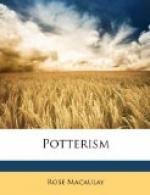He saw, as he passed a newspaper stand, placards in big black letters—’Bride’s Suicide.’ ‘Divorce of Baronet.’ Then, small and inconspicuous, hardly hoping for attention, ‘Italy and the Adriatic.’ For one person who would care about Italy and the Adriatic, there would, presumably, be a hundred who would care about the bride and the baronet. Presumably; else why the placards? Gideon honestly tried to bend his impersonal and political mind to understand it. He knew no such people, yet one had to believe they existed; people who really cared that a bride with whom they had no acquaintance (why a bride? Did that make her more interesting?) had taken her life; and that a baronet (also a perfect stranger) had had his marriage dissolved in a court of law. What quality did it indicate, this curious and inexplicable interest in these topics so tedious to himself and to most of his personal acquaintances? Was it a love of romance? But what romance was to be found in suicide or divorce? Romance Gideon knew; knew how it girdled the world, heard the beat of its steps in far forests, the whisper of its wings on dark seas.... It is there, not in divorces and suicides. Were people perhaps moved by desire to hear about the misfortunes of others? No, because they also welcomed with eagerness the more cheerful domestic episodes reported. Was it, then, some fundamental, elemental interest in fundamental things, such as love, hate, birth, death? That was possibly it. The relation of states one with another are the product of civilisation, and need an at least rudimentarily political brain to grasp them. The relations of human beings are natural, and only need the human heart for their understanding. That part of man’s mind which has been, for some obscure reason, inaccurately called the heart, was enormously and disproportionately stronger than the rest of the mind, the thinking part.
‘Light Caught Bending,’ another placard remarked. That was more cheerful, though it was an idiotic way of putting a theory as to the curvature of space, but it was refreshing that, apparently, people were expected to be excited by that too. And, Gideon knew it, they were. Einstein’s theory as to space and light would be discussed, with varying degrees of intelligence, most of them low, in many a cottage, many a club, many a train. There would be columns about it in the Sunday papers, with little Sunday remarks to the effect that the finiteness of space did not limit the infinity of God. Scientists have naif minds where God is concerned; they see him, if at all, in terms of space.
Anyhow, there it was. People were interested not only in divorce, suicide, and murder, but in light and space, undulations and gravitation. That was rather jolly, for that was true romance. It gave one more hope. Even though people might like their science in cheap and absurd tabloid form, they did like it. The Potter press exulted in scientific discoveries made easy, but it was better than not exulting in them at all. For these were things as they were, and therefore the things that mattered. This was the satisfying world of hard, difficult facts, without slush and without sentiment. This was the world where truth was sought for its own sake.




